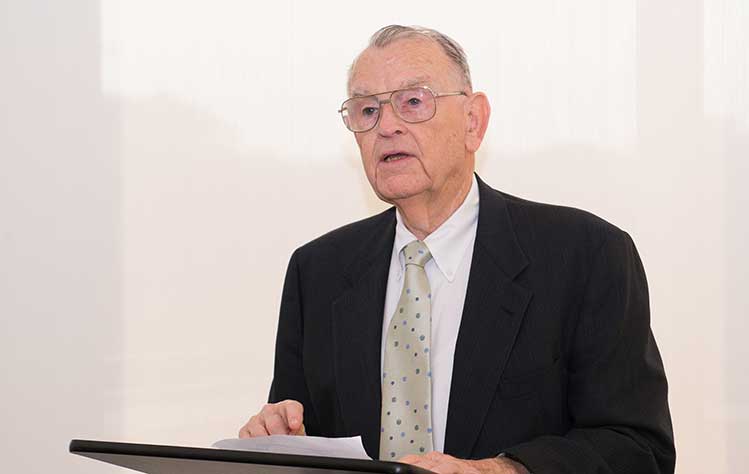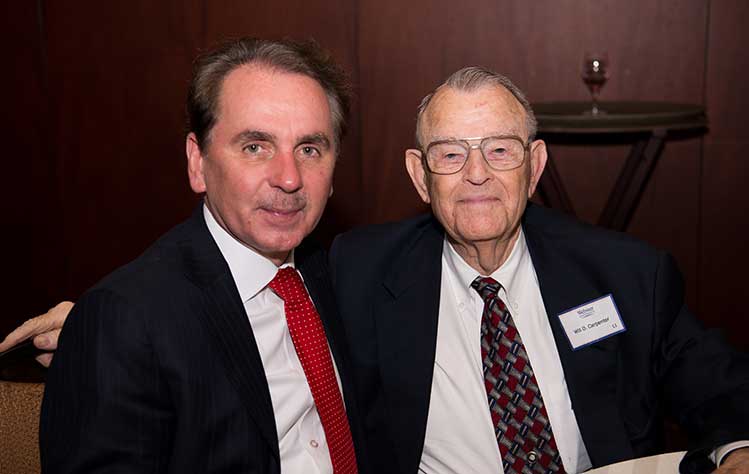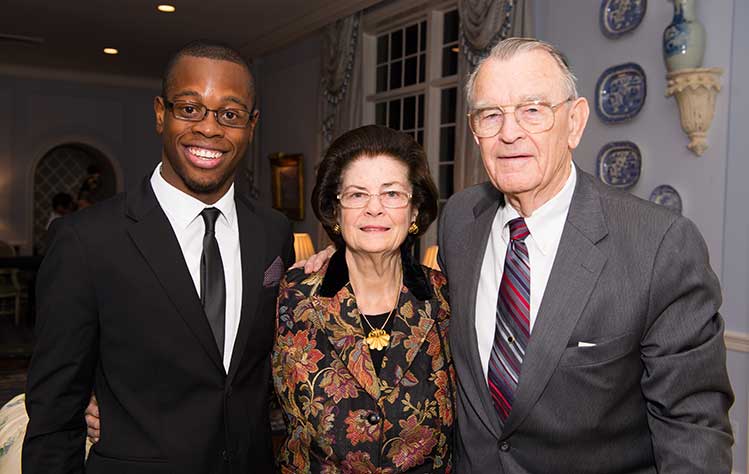Remembering Will D. Carpenter
August 16, 2023
 Photo: Will Carpenter speaks during Webster's Global Leadership Summit in 2014.
Photo: Will Carpenter speaks during Webster's Global Leadership Summit in 2014.
Will Dockery Carpenter, who received an honorary doctorate of humanitarian services from Webster University in 2020, was a long-time advisor to Webster, and was a frequent donor and supporter of University programs, passed away on Aug. 15, 2023 at the age of 93.
Carpenter was well known in the world of science and helped form an organization that won the Nobel Peace Prize. He also was a strong supporter of Webster University.
“The loss of Dr. Will D. Carpenter is profound. As I reflected in 2014, with the publication of ‘Will D: A Life in Science,’ ‘To know Will Carpenter is to know at once a compassionate mentor, master storyteller, and world-renowned researcher and chemical weapons treaty advocate.’ His landmark contributions to science formed the foundation of his generous and insightful advice and leadership for Webster initiatives,” said Webster University Chancellor Elizabeth (Beth) J. Stroble. “Personally, I will miss his warmth and care as a long-time friend and mentor. I am grateful for his many gifts and am glad for the legacy he has left at Webster and in our lives.”
Carpenter was a donor and an advisor to Webster University whose expertise has informed major initiatives, with an emphasis on projects that focused on science. He served on the College of Arts & Sciences Advisory Board (2002-2009), and its Global Leadership Academy Advisory Board (2012-2017). He and his wife Hellen were loyal and generous donors and members of Webster’s 1915 Society, Legacy Society, and annual members of the Webster Society (2004-2018). They established the Will and Hellen Carpenter "Late Bloomer" Endowed Scholarship for undergraduate students in Webster's College of Science and Health pursuing a science degree who show the most improvement, and in addition, provided funding for annual scholarships, supported the College of Arts & Sciences, and the construction of the Interdisciplinary Science Building - Browning Hall, where their gift is recognized with the naming of a faculty office.
“Will’s advice and guidance was invaluable to Webster, especially during a time when we invested heavily in the sciences, leading to the construction of Browning Hall,” said Webster University President Julian Z. Schuster. “He was a true believer in education and the sharing of knowledge. It was a privilege to interact with Will and the Webster community is richer for having known him.”
 Photo: President Julian Schuster (then provost) and Will Carpenter at the Daniel Webster
Society Dinner in 2016.
Photo: President Julian Schuster (then provost) and Will Carpenter at the Daniel Webster
Society Dinner in 2016.
Carpenter held a doctorate in plant physiology from Purdue University. He spent his entire professional career with Monsanto, retiring in 1992 after 34 years with the company during which he served as head of research and product development and as principal spokesman on environmental issues. He began as a research biochemist in 1958 and worked his way to vice president, general manager of New Products, helping develop Round-Up and other top-selling herbicides.
After retiring from Monsanto, Carpenter was chairman of the board of Agridyne Technologies, INC, and executive-in-residence at Mississippi State University. He was on the initial board of Aetos Technologies, Inc and three subsidiaries until 2008. He was an advisor to Chem First, Mississippi Chemical Company, and for Rohm and Haas Company.
He earned an international reputation in the science community for his work in developing advances in agricultural technology to combat world hunger, and for his efforts to eliminate chemical weapons. From 1978 to 2003, he was deeply involved in the efforts to obtain a worldwide chemical weapons treaty. He was the primary representative for the American Chemical Manufacturers Association during the successful negotiations that led to the signing and ratification of the Chemical Weapons Convention.
As part of this work, Carpenter testified numerous times before Congress and worked with chemical companies worldwide to help bring them on board with the terms of the treaty. Out of that convention, the Organisation for the Prohibition of Chemical Weapons (OPCW) was formed. The organization won the 2013 Nobel Peace Prize. After the formation of the OPCW, Carpenter was named the U.S. representative to the Scientific Advisory Board. He was awarded The AAAS Hilliard Roderick Prize for Excellence in Science, Arms Control, and International Security in 1992 for his participation on the Chemical Weapons Convention.
He also was awarded the Hilliard Roderick Prize and Medal in science, Arms Control, and International Security in 1992, the Rene Dubois Environmental Award that same year, and earned numerous recognitions from several universities and trade organizations.
His impact in agricultural development, environmental policy, and the disarmament of chemical weaponry is chronicled in the book “will d. … a life in science,” written by Thomas R. Lawrence and published in 2014 by Front Porch Press.
Carpenter was a native of Moorhead, Miss. He served in the Naval Reserve from the age of 17 to 20 and saw active duty in the U.S. Army in the U.S. and Korea from 1952 through 1954. He was discharged from the active reserves with the rank of Captain, Artillery in 1961. He is survived by his daughter, Hellen Celeste Carpenter Cox, son Will Aubrey Carpenter, seven grand children and three great-grandchildren. He was preceded in death by his wife, Hellen.
 Photo: Will and Hellen Carpenter with Christopher Whitmore at the Daniel Webster Society
Dinner in 2013.
Photo: Will and Hellen Carpenter with Christopher Whitmore at the Daniel Webster Society
Dinner in 2013.
